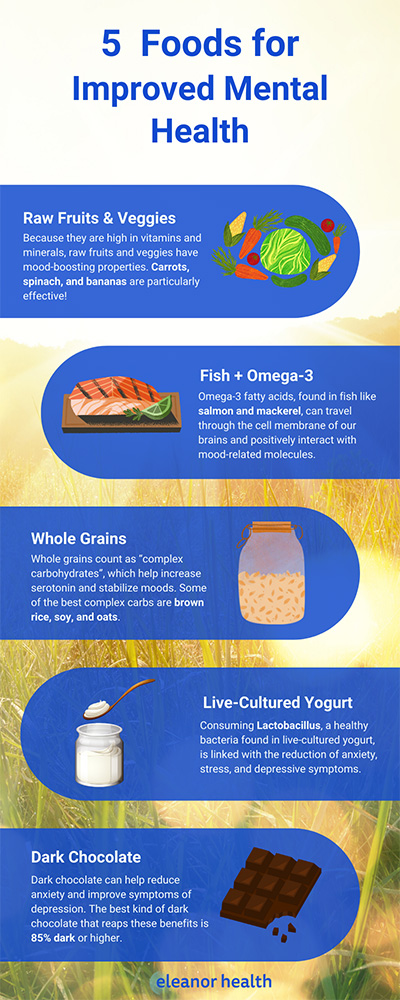If you’ve heard of the popular saying, “you are what you eat,” you would know that the food we choose to consume affects our ability to function in our daily lives. We tend to view food simply as a means to stay alive and support our bodies in having enough energy to complete everyday tasks. However, something often overlooked is just how much a healthy diet can impact our mental health. So, if we are what we eat, how can we ensure that what we eat is helping not just our bodies, but our minds as well? Keep reading to find out!
Increasing your intake of raw fruits and vegetables may significantly reduce depressive symptoms and increase positive moods, such as satisfaction with one’s life [1]. Some of the most mood-boosting fruits and vegetables are:
Omega-3 fatty acids, which are highly prevalent in fish, can travel through the cell membrane of our brains and positively interact with mood-related molecules. In effect, the addition of omega-3 fatty acids to your diet may reduce negative feelings. These acids also have anti-inflammatory actions, which may help relieve depression [4]. Some of the best types of fish for increasing omega-3 fatty acid intake are:
Whole grains count as “complex carbohydrates”, which help increase serotonin and stabilize moods. Non-complex carbohydrates present in foods like white bread and white rice do not have these same benefits. Whole grains and complex carbohydrates also absorb tryptophan, which rebuilds energy. Increased energy may help create a more positive and more motivated outlook on life [5]. Some of the healthiest types of whole grains include:
Research has found that consuming Lactobacillus, a healthy bacteria in live-cultured yogurt, is linked with reducing anxiety, stress, and depressive symptoms.
Great news for chocolate lovers! Now one of your favorite treats counts as healthy eating. Research has shown that eating dark chocolate in moderation can help reduce anxiety and improve symptoms of depression. The best kind of dark chocolate that reaps these benefits is 85% dark or higher. Milk chocolate unfortunately does not hold the same effects, so the darker the better!

Before delving into the most effective diets to incorporate for mental wellness, it is first extremely important to note that dieting can potentially impact one’s mental wellbeing if viewed in an unhealthy way. Unhealthy diet culture may contribute to an increase in stress, rigidity, and negative body image, especially for those who may struggle with perfectionism or preexisting body dysmorphia. However, if viewed healthily, certain diets are more effective than others in improving mental wellness. Take the former into consideration and assess if you are in the right state of mind before implementing a new diet!
Have you ever noticed that eating fast food or large quantity meals makes you feel like crawling into bed and taking a nap? This is because foods high in sugar and sodium and low in potassium often contribute to low energy and motivation, which may lead to depression [6]. One study tested this exact phenomenon and found that the urine of depressed teenagers contained high levels of sodium and low levels of potassium at the baseline level of depression. After 1.5 years, the participants that reported their depression worsened over time similarly had increased levels of sodium and decreased levels of potassium in their urine since the baseline test. This shows that a lack of nutrients and an influx of sodium is associated with worsened depression and mental health.
Depression, anxiety, and general stress often make it difficult for one to see the small lifestyle changes one can make to improve their wellbeing. A healthy diet rich in mental health improving foods is a perfect first step in the right direction. Next time you are in the grocery store, add some whole foods to your list and remember to not only nourish your body but your mind as well!
———————————————————————————————————
Eleanor Health provides treatment services for adults with alcohol, opioid, and other substance use disorders as well as mental health treatment. We are currently located in Florida, Louisiana, Massachusetts, New Jersey, North Carolina, Ohio, Texas, and Washington.
 5 Tips for Stress Management
5 Tips for Stress Management
 Post-Traumatic Stress Disorder
Post-Traumatic Stress Disorder
 Benefits of Exercise on Mental Health
Benefits of Exercise on Mental Health